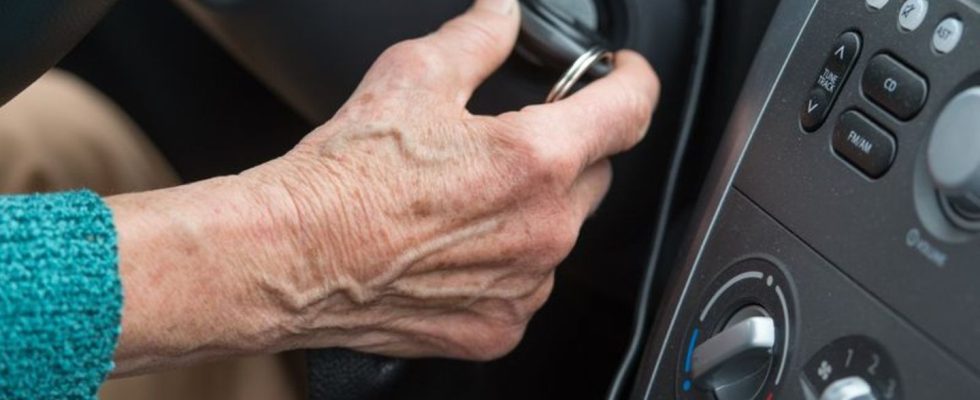Traffic
Seniors at the wheel: debate about “driver’s license TÜV”
The participant in a driving training course for seniors on the “Action Day for Seniors in Road Traffic” in Beeskow, Brandenburg. photo
© Patrick Pleul/dpa-Zentralbild/dpa
Should drivers over 70 be checked in the future to see if they are still fit to drive? How can road safety be increased? The EU Commission’s driving license plans have fueled a discussion.
In Germany, a debate about older people behind the wheel has flared up. Should there be new rules for more road safety? The triggers are plans by the EU Commission.
The German Road Safety Council rejects a possible mandatory check of seniors’ fitness to drive. This is disproportionate, said the Road Safety Council of the German Press Agency. “Driving a car yourself means independence and flexibility for most people. For many older people in particular, having their own car is an important part of their everyday life.” The accident researcher Siegfried Brockmann proposes a compulsory “re-registration trip” from the age of 75.
Debate also at EU level
The background is an ongoing debate about plans by the EU Commission. The Brussels authority had already presented this at the beginning of March. One of the goals is to make the roads in the EU safer. In this regard, new rules for seniors are also planned.
According to the Commission, this means that people over 70 should either complete a self-assessment of their fitness to drive every five years or have a medical examination carried out. “The decision whether to self-assess or check with a doctor is up to the Member States,” writes the Commission.
The authority also stressed that this applies to every renewal of the driver’s license. According to the proposals, driving licenses issued after January 19, 2013 should no longer be unlimited, but only valid for 15 years, writes the EU Commission. From the age of 70, according to the plans, driving licenses should have to be renewed every five years. The European Parliament and the EU states must now find positions on the project and negotiate a compromise before new rules can come into force. So changes are possible.
Wissing thinks “nothing at all” about the idea
It is unlikely that there will soon be mandatory tests for senior citizens in Germany: Federal Transport Minister Volker Wissing (FDP) had already spoken out against it. He told the “Bild am Sonntag”: “I don’t believe in the idea that senior citizens from a certain age have to undergo a regular fitness test without any further reason.”
A spokeswoman for the ministry said that Germany is of the opinion that health examinations for car and motorcyclist drivers should only be carried out on an ad hoc basis, i.e. if there are concrete indications of physical or mental unfitness to drive. This also applies to seniors.
The German Road Safety Council announced that the proportion of people aged 65 or more in the total population is currently around 22 percent. But only about 14.5 percent of all those involved in accidents with personal injury can be assigned to this age group. “As a result, older people are less involved in accidents than their share of the population. In general, it can even be stated that older people are more at risk on the road than they pose a danger.”
According to the Road Safety Council, there is no optimal time for such a suitability test. “On the other hand, the best would be lifelong learning with different focal points depending on one’s life situation and mobility needs.” Measures to maintain competence or for training should start at the age of 75 at the latest, since from this age the ability to perform decreases measurably. “However, voluntary participation in effective measures should be preferred for reasons of acceptance and should be advertised intensively.”
Accident risk similar to that of 18 to 24 year olds
Siegfried Brockmann, head of accident research at the insurers, told the German Press Agency that the EU Commission’s plans do not entail any obligation to carry out a fitness to drive test. The central point is that from the age of 70, driver’s licenses have to be renewed every five years, via a self-disclosure. Ultimately, that could only mean a new photo and a trip to the office.
But that misses the core of the problem, says Brockmann. Statistics say in absolute numbers that seniors do not have an excessive risk of accidents. “But seniors drive much less by car. Based on the mileage, seniors have a higher accident risk – similar to 18 to 24-year-olds.”
There is a need for action. Brockmann proposes an obligatory “feedback trip” from the age of 75. This is a driving lesson, for example, with a driving instructor. The seniors would get feedback about the trip and a recommendation as to which routes they shouldn’t drive anymore. The driver’s license remains in any case.
The German traffic watch is also for mandatory feedback trips from the age of 75, as a spokesman said. If older people are involved in an accident, they also caused it in most cases. In terms of driving performance, the accident risk is therefore even higher than for boys. In addition, the consequences of the accident are worse because the physical resistance decreases.
The ADAC has already warned of a “driving ability TÜV” for pensioners. The motorists’ club rejected planned measures that relate to a certain age.

